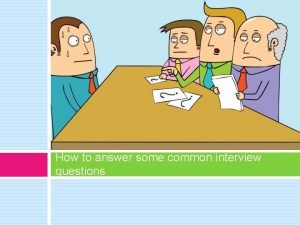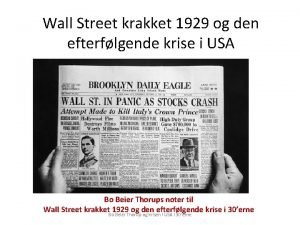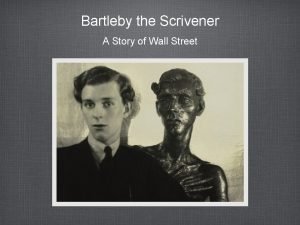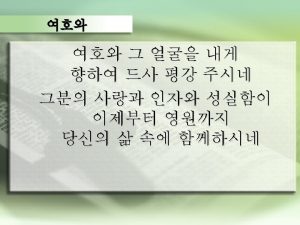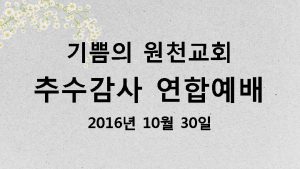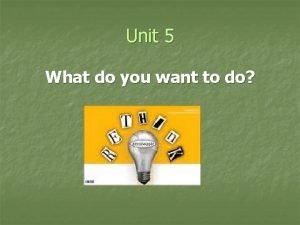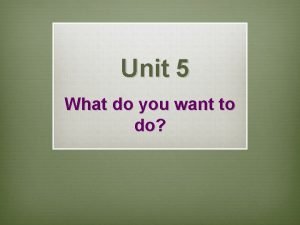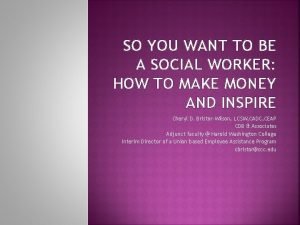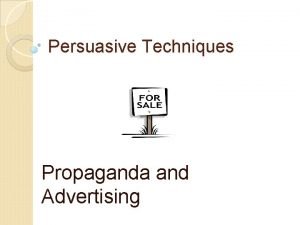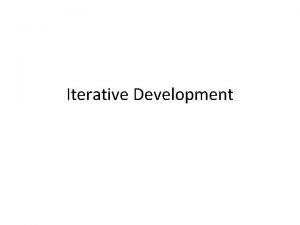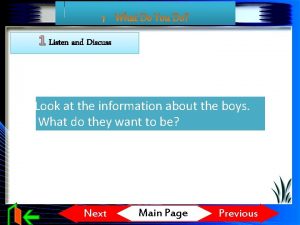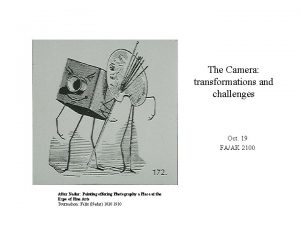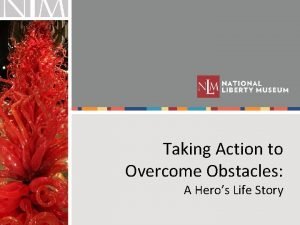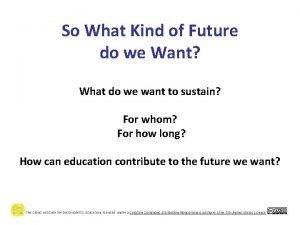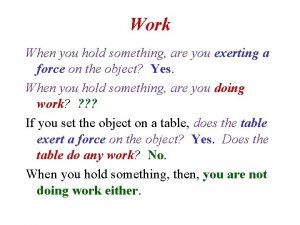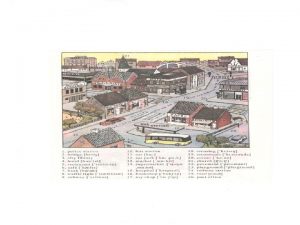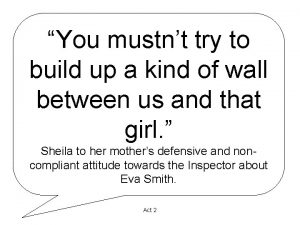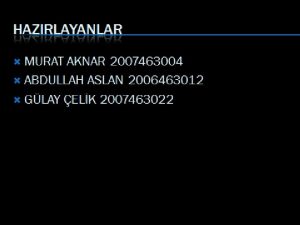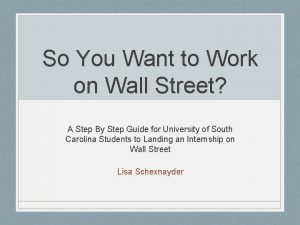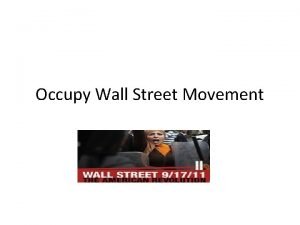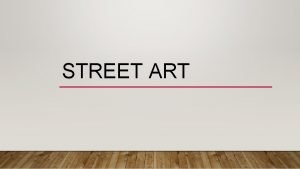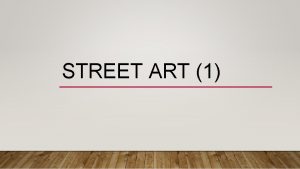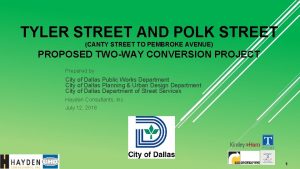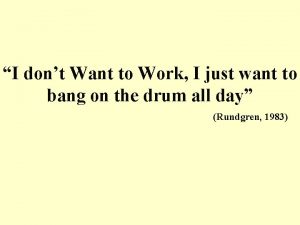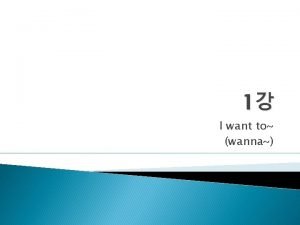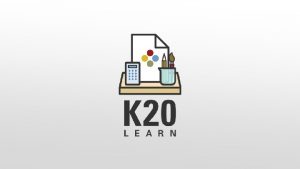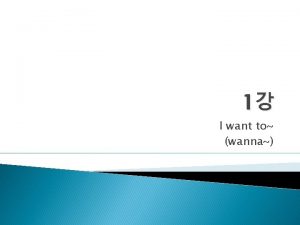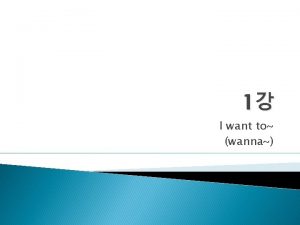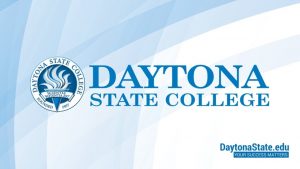So You Want to Work on Wall Street











































- Slides: 43

So You Want to Work on Wall Street? A Step By Step Guide for University of South Carolina Students to Landing an Internship on Wall Street Lisa Lynn Schexnayder

Are You Sure? ü You are about to enter a highly competitive environment, experience 15 hour (or more) work days, and be forced to do constant networking. This is not the place for laziness or coasting. You may not have a social life in the first few years. Be prepared to sacrifice. ü It helps to find a friend going through the process at the same time. This keeps you accountable and helps with interview preparation.

Don’t Be Too Scared ü As you gain seniority, your duties change and become less demanding. You will become better and more efficient at your job, so your hours will ease up. ü Exit opportunities are a huge benefit. After a few years, you will meet people and have access to awesome opportunities that you would not have otherwise, such as jobs in private equity, hedge funds, venture capital, corporate development, etc. ü View your 2 -3 year analyst position as your graduate school. Your friends in law school and medical school are going through similar demanding boot camps, however nobody says “Oh I don’t want to go to law school because I won’t have any free time. ” Regardless of the field, everyone has to put in the hours.

What Does an Investment Bank Actually Do? ü You may be asked this exact question in interviews, so be sure you can answer. ü An investment bank helps corporations in raising capital. Banks provide an advisory role for company valuations, negotiations between buyers and sellers, and the pricing and structuring of transactions. Banks also buy and sell securities to facilitate trading activity.

What Does an Investment Bank Actually Do? ü Investment Banking Division (IBD) – This division helps clients raise money in debt and equity capital markets by facilitating transactions. IBD advises companies on valuations, pricing, structuring, and implementation. ü Sales & Trading – The bank matches buyers and sellers of securities, and buys and sells securities for their own accounts. This includes the “trading floor” that is most frequently publicized in movies. ü Research – This is the part of the bank that reviews companies and writes reports on future earnings prospects, which are then sold to finance professionals.

Product vs. Coverage Groups ü Within IBD, the structure is further divided into coverage groups and product groups. ü Coverage groups cover clients within a specific industry. Bankers are experts on the industry and gain exposure to a wide variety of deals. ü Examples: Technology/Media, Real Estate, Financial Sponsors, Energy, Industrials, Financial Institutions/FIG, Healthcare ü Product groups focus on specific types of transactions. Bankers gain exposure to deals across a variety of industries. ü Examples: Leveraged Finance, Mergers & Acquisitions, Restructuring, Capital Markets

Set Yourself Up for Success ü Get involved in meaningful organizations as early as possible in college. ü The Carolina Finance & Investment Association (CFIA) is a great way to find other individuals interested in high level finance careers. Many of the seniors have already done internships and would be happy to talk to you! The CFIA hosts bi-weekly speakers from various finance fields, field trips to Charlotte & Atlanta banks, and Wall Street Prep/Training The Street every semester. I could not have gotten my internship without the CFIA! ü Others: Delta Sigma Pi, University Ambassadors ü If you are a sophomore, apply for the Finance Scholars Program!

Set Yourself Up for Success ü Take Finance 363 your sophomore year so that you have a solid finance background before you begin junior year internship interviews. ü Take the Wall Street Prep and Training the Street courses when they are offered at USC. ü Put this on your resume under Education. ü Learn Excel shortcuts (Appendix A). Work on using the mouse as little as possible. ü Pay attention to the news. Read the Wall Street Journal, Bloomberg News, The Economist, BBC News. ü Don’t waste your time with Fox News, CNN, etc.

Set Yourself Up for Success ü Learn how to use the Bloomberg Terminal. I recommend taking the Bloomberg Markets Concepts certification on the computers in the Darla Moore School Trading Room. You will learn over 70 Bloomberg Terminal Functions and learn about the markets. The four main categories are economics, foreign currencies, fixed income and equities. This 8 -hour, self paced course is free with a student email address. The BMC Certification looks great on a resume and will differentiate you from your peers.

Set Yourself Up for Success ü Maintain at least a 3. 6 GPA. ü Don’t be scared to get to know seniors; they will provide valuable advice and can potentially be contacts within a bank in the future. ü Have an internship the summer after your sophomore year (maybe even freshman year) that is relevant to finance. ü Put your resume together & start networking! ü Graduate on time.

Know Yourself ü Your story is important. Make sure you can tell it well before you start talking to people. ü This will be asked in every interview in some way. Most interviews start out with “So tell me about yourself…” Don’t just read through your resume, rather use your story as a chance to show your life’s logical progression towards finance and investment banking.

Perfect your Elevator Pitch ü Be able to talk about yourself and your story in under a minute. Answer questions such as: ü(Briefly) what is your background? üWhy are you interested in banking? üWhat skills do you have that make you the ideal candidate? ü Practice your pitch out loud. ü Practice your pitch in front of others.

My Junior Year Elevator Pitch ü Hi, my name is Lisa Schexnayder and I’m a finance major at the University of South Carolina. As long as I can remember, I’ve been interested in investment banking because of my love of math and I want to be in an exciting, fast paced environment. I’m looking for an internship where I can use my intuition and analytical skills that I’ve been developing during my time in the University’s Budget Office. I’m very excited about the opportunity to learn from more experienced bankers and be a part of a dynamic team.

Perfect your Resume ü Without a doubt, your resume must be 100% error free, or it will go directly into the trash. If you can’t demonstrate attention to detail in presenting yourself in the job search, employers will never trust your work on the job. ü Important Sections: Internships, GPA, Major, Leadership Activities, Interests ü Have a finance internship the summer after your sophomore year! ü My Resume: Appendix B

Perfect your Resume: Interests ü The interests section is actually important! Many people have asked me about my interests in interviews. You want the interviewer to connect with you on a subject for many reasons: ü They will remember you better. ü You appear easy to talk to. ü You can kill 5 -10 minutes on a low-stress topic. Amazingly, they don’t want to talk about finance all day either. ü Don’t be vague: Reading, music, traveling, etc. Everyone likes to travel. If you play the cello, that is great to include. Just don’t say “music. ” ü Don’t be weird: Anime, comic books, zombies, blood, cats, etc.

Perfect your Resume ü If your only IT Skills are “Power. Point, Excel, & Word” don’t bother having an IT Skills section. ü Don’t be overly cocky about “advanced Excel knowledge. ” Pivot tables and v-lookups are not “advanced” knowledge. ü This is where including Wall Street Prep on your resume comes in handy; it proves you know the relevant Excel features and tricks (like shortcuts). Interviewers frequently asked about Wall Street Prep. This was a great chance to show my experience with financial modeling in Excel.

Perfect your Resume ü Always send your resume as a PDF. It ensures that your file can be opened on any operating system. ü You don’t need to list high school activities on your resume after sophomore year of college. Maybe include your SAT score if it is extremely high and you need to take up space. ü Ask seniors for their resumes and copy their formatting.

Linked. In / Social Media ü Have a Linked. In profile. People will Google your name and easily learn the basics about your school, internships, extra-curriculars, etc. ü When reaching out to alumni on Linked. In, include a personalized message in your invitation. They are more likely to pay attention when you say that you are from the same school, fraternity, etc. This can be a great way to find contacts for informational interviews. ü Hide your Facebook/Instagram/Twitter accounts, and delete all “less than ideal” content. This should be a given.

Who do you know? ü Start small; first reach out to juniors/seniors who have already been part of this process. They have the most time available to speak with you so pick their brains. ü Reach out to alumni. USC is underrepresented on Wall Street, so alumni bankers are very happy to help worthy students.

Who do you know? ü Make a list of everyone you know that works in finance, or used to work in finance, or knows someone who works in finance. ü Don’t be scared to reach out to your girlfriend’s father or your grandparent’s neighbor’s son. Most people are happy to help! ü Don’t ask for a job or expect them to automatically submit your resume for you. Ask for an informational interview!

Email Etiquette ü Don’t use “Dear” – you are too old for that! üBegin emails with their first name and a comma. ü Be comfortable with calling people by their first name if they are around your age (analysts & associates). ü Sign your email with ü“Best, ” ü“Thank you, ” ü“Regards, ”

Email Etiquette ü Keep it short. People are busy & you are asking for their time. ü Remember, if you send your resume, format it as a PDF file. ü Double check for spelling and grammar mistakes. üAttention to detail is crucial on the job, so you should start double checking everything now.

Email Etiquette ü When you are ready to set up a phone conversation, you should be doing the calling. ü Ask when the person is available and at what number you can reach them. ü Do not give them your number and tell them when they should call you. However, they may offer to call you around a certain time. In this case, be available!

During the Informational Interview ü Begin by asking the banker about themselves. People like to talk about themselves, and you don’t want to be too pushy and seem like you are only asking for a job. Some questions it may be helpful to ask during your first few informational interviews: üWhat is your role at ABC Bank? üHow did you get to this position? üWhat is the culture like at ABC Bank? üWhat is the most rewarding part of your job?

During the Informational Interview ü Practice your elevator pitch! ü Have a goal for every conversation and learn from each person you speak to. Ask: ü How can I best position myself for a job in investment banking? ü How can I be competitive for an investment banking job? ü Is there anyone else at ABC Bank that you think I would benefit from speaking with? ü Do you mind if I follow up with you down the road? ü Take notes during the phone call.

Follow Up ü If someone was generous enough to donate 10 minutes of their time, you better follow up with a thank you email that day. ü Mention something you guys discussed that was meaningful to you. This helps them remember your conversation better & shows that you were paying attention. ü Remember everyone’s names. You will meet people that know people you’ve already met.

Baby Steps…. ü After you have a decent number of informational interviews under your belt, you may be ready to start real interviewing. ü Contacts with whom the info interview went well may pass along your resume to their bank’s HR department. This is the most likely way to get a first round interview in New York City. ü Of course, you can always apply to internships online, but rumor has it that these are black holes.

Interview Prep: Technicals ü Knowing technical information is not enough to get the job alone. Yet, this is extremely important because answers correctly and quickly proves that you are adequately prepared for the interview. If you miss technical questions, this will greatly hurt your chances. ü “Technicals show that you are qualified, your story gets you a job. ” – Robbie Walters, USC c/o 2012 ü Know the basics of accounting and finance. ü Wells Fargo always asks “What are the four main methods of valuation? ” and “Walk me through a DCF. ” ü Know how to calculate a company’s WACC.

Interview Prep: Technicals ü Acquire the Vault guides from the CFIA website. ü Know everything on http: //www. ibankingfaq. com/ ü Other super useful websites: ühttp: //www. khanacademy. org/ ühttp: //www. mergersandinquisitions. com/ ühttp: //www. wallstreetoasis. com/

Interview Prep: Fit ü Since you will be spending long hours with your team, they want to make sure that they like your personality before they hire you! ü Show off your awesome personality and teamwork skills. ü If you are more introverted, fake it ‘til you make it. Remember, if you have made it past informational interviews to this point, you are doing something right. Have confidence! ü Practice interviewing with your peers as often as you can. Don’t wait until you have an interview to begin. If you start early, you will have more confidence and less stress the night before an interview!

Fit Questions ü Interviews almost always start out with “Walk me through your resume. ” or “Tell me about yourself. ” ü Here is where having your elevator pitch down perfectly is crucial! Remember, you want to show a logical progression in your life leading to your desire to be a banker. ü What are your strengths? ü Use this question to emphasize your analytic/quantitative skills, communication skills, attention to detail, and ability to learn quickly. Use examples from school, jobs, or leadership roles. ü Look up the company’s career page. Many times banks will list job descriptions for available internships. Make sure your strengths align with those they are searching for.

Fit Questions ü What are your weaknesses? üThere is no good way to answer this question. You don’t want to say anything that is a real weakness, but you definitely can’t say that you don’t have any weaknesses. Figure out something that is harmless and secretly shows off a strength. ü“Sometimes I get too focused on a project that I end up pushing aside aspects of my personal life. ” ü“I am a perfectionist so I get upset when others around me do not show the same dedication to their work. ”

Fit Questions ü Why do you want to be an investment banker? üA great answer centers around skill-building, networking, and the love of challenges. üThis is another opportunity to mention your abilities: critical thinking, quantitative analysis, strong work ethic, etc. üI told a story of the specific event that began my interest in business: a business summer camp I attended in high school, where I lead my “company” to a 1 st place victory as the CEO in a week-long competition.

Fit Questions ü Why do you want to be an investment banker? üIf you were not originally a business major, emphasize the turning point in your college career that got you interested in banking. Example: ü I began college interested in biology and medicine. I volunteered at a hospital in my hometown, where I witnessed many pharmaceutical representatives visiting the doctors and advertising different medications. I started to recognize those drug names in the news when many of the pharmaceutical companies were engaging in mergers and acquisitions among each other. This piqued my interest in businesses. Ultimately, I hope to use my biology background in a healthcare group.

Fit Questions ü Why do you want to work at ABC Bank? ü This is a great chance to prove that you’ve done your research! If you know friends or alumni that work at the bank, definitely mention them and how they have had a positive experience there. ü If it is a smaller bank, emphasize how you are excited about having more responsibility and more interaction with senior bankers and clients. ü If it is a bulge bracket bank, focus on how you are excited about getting a broad education and exposure to large deals. ü Don’t say “the culture” or “people are smart” as this is way to vague and you can use your interview time more effectively!

Fit Questions ü Teamwork is crucial in investment banking. Show that you are a team player with strong communication and listening skills. You may be asked to give an examples: üDescribe a time when you handled conflict in a group setting. üDescribe a time when you demonstrated leadership. üDescribe a time when you handled conflict with a superior.

Interview Prep ü “Do you have any questions for me? ” üThis will be asked every interview at the end, so be prepared with a few. The interviewer may have touched on these subjects already. Examples: ü What deals are you working on now? ü What is your favorite part about working in this bank/group? ü How do you compare working at ABC Bank with the last bank you worked at? ü What are the daily responsibilities of an intern in this group? ü Can you tell me about the training programs?

Congratulations! ü Ultimately, if you work hard, prepare, and network effectively, you should be successful in landing an internship! Congratulations! ü Now, it is important that you continue to do your best on the job. Ask questions and learn as much as you can about banking, your group, and the markets. ü You will leave an impression of USC at your bank, so make sure it is a positive one. Future students will thank you!

Tips for Turning an Internship into a Full Time Offer ü Double check everything before you turn it in to your superiors. Be meticulous and error free. Think critically and try to figure out what mistakes your superior would catch, and fix them before you turn in your work. ü Be a team player. Don’t complain about the hours or the work you are doing. Keep a smile on your face and it will make everyone’s lives easier. ü If you aren’t actively working on a project, go around the group and ask if you can help others with anything. They will notice and appreciate your efforts, whether or not they have any assignments for you.

Tips for Turning an Internship into a Full Time Offer ü Don’t leave at 5: 00. Absolutely stay later than the directors do, but it is best if you stay as late as the analysts and associates. This proves that you are fully dedicated to your position. ü Don’t ask a question without Googling it first. People will be annoyed if you waste their time by asking them basic questions. If Google can’t help you, ask your fellow interns, and then go to the analysts. ü Don’t be on your cell phone at your desk. Your job is more important than your Facebook feed.

Lisa Lynn Schexnayder lisalynn 312@gmail. com

Appendix A: Excel Shortcuts ü The following are some of the most valuable shortcuts from my personal experience. ü Ctrl+Home = goes to cell A 1 ü Ctrl+Arrow = jump to start/end of a range ü Shift+Spacebar = Select entire row ü Ctrl+Spacebar = Select entire column ü Ctrl+Tab = Toggle between open workbooks ü Alt + letter sequence = allows you to navigate through the top ribbon and go to any function ü Ctrl+L = turn text into a table where you can use filters ü Ctrl+D = fills the selected column down ü Ctrl+R = fills the selected row to the right Go Back

Go Back
 Why do you want to work for us
Why do you want to work for us Elements of spoken word poetry
Elements of spoken word poetry Børskrakket 1929
Børskrakket 1929 Jordan belfort leadership style
Jordan belfort leadership style Bartelby the scrivener
Bartelby the scrivener Konferencja wall street
Konferencja wall street Wall street crash of 1929
Wall street crash of 1929 Wall street journal manufacturing
Wall street journal manufacturing Sound wall vs word wall
Sound wall vs word wall Wall to wall chris brown
Wall to wall chris brown Half brick wall
Half brick wall Members used to carry wall loads over wall openings
Members used to carry wall loads over wall openings The wall of ovary develops into wall of fruit called
The wall of ovary develops into wall of fruit called Works present simple
Works present simple Sedlabanki is gengi
Sedlabanki is gengi Betty wanted to know when i had come
Betty wanted to know when i had come More more more i want more more more more we praise you
More more more i want more more more more we praise you More more more i want more more more more we praise you
More more more i want more more more more we praise you Unit 5 grammar future time answers
Unit 5 grammar future time answers Unit 5 what do you want to do
Unit 5 what do you want to do So you want to be a social worker
So you want to be a social worker It's everywhere you want to be slogan
It's everywhere you want to be slogan Plain folks persuasive technique
Plain folks persuasive technique Motivated last thing you want do
Motivated last thing you want do If you go fast go alone
If you go fast go alone We ______ snowman in winter.
We ______ snowman in winter. Omar is going to the watani football school
Omar is going to the watani football school Jeff wall photography
Jeff wall photography Like a rushing wind jesus breathe within
Like a rushing wind jesus breathe within Do you want me to be honest
Do you want me to be honest Suppose you want to combine two types of fruit drink
Suppose you want to combine two types of fruit drink How did helen keller overcome adversity
How did helen keller overcome adversity Do you want to be made well
Do you want to be made well I want you doing
I want you doing Which country do you want to go
Which country do you want to go Club of rome schulen deutschland
Club of rome schulen deutschland If you want joy real joy wonderful joy
If you want joy real joy wonderful joy What kind of future do you want
What kind of future do you want If you want to know me by noemia de sousa
If you want to know me by noemia de sousa Unit 5 what do you want to do
Unit 5 what do you want to do Privacy is the right to be left alone when you want to be
Privacy is the right to be left alone when you want to be When you do work you are exerting
When you do work you are exerting Stop look and listen before you cross the street
Stop look and listen before you cross the street Nothing but morbid curiosity
Nothing but morbid curiosity
